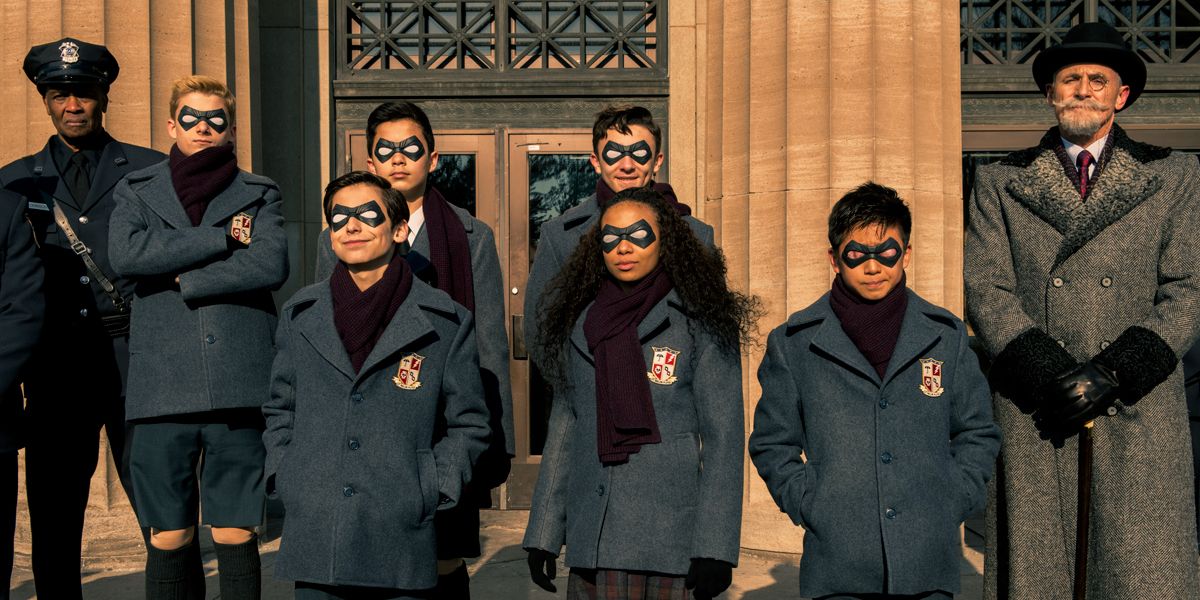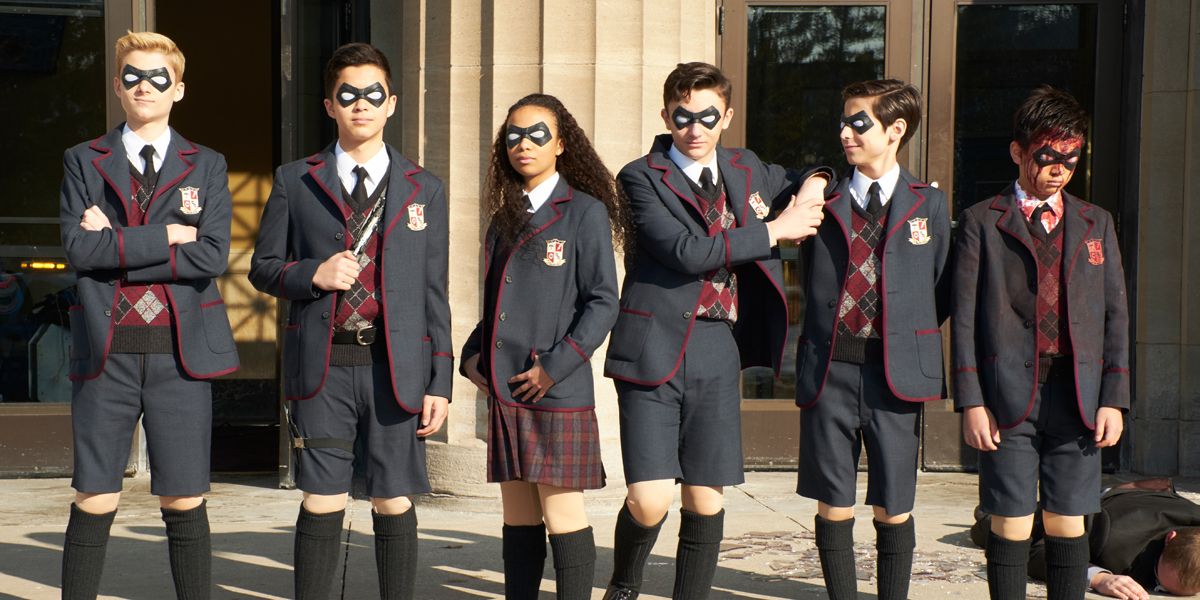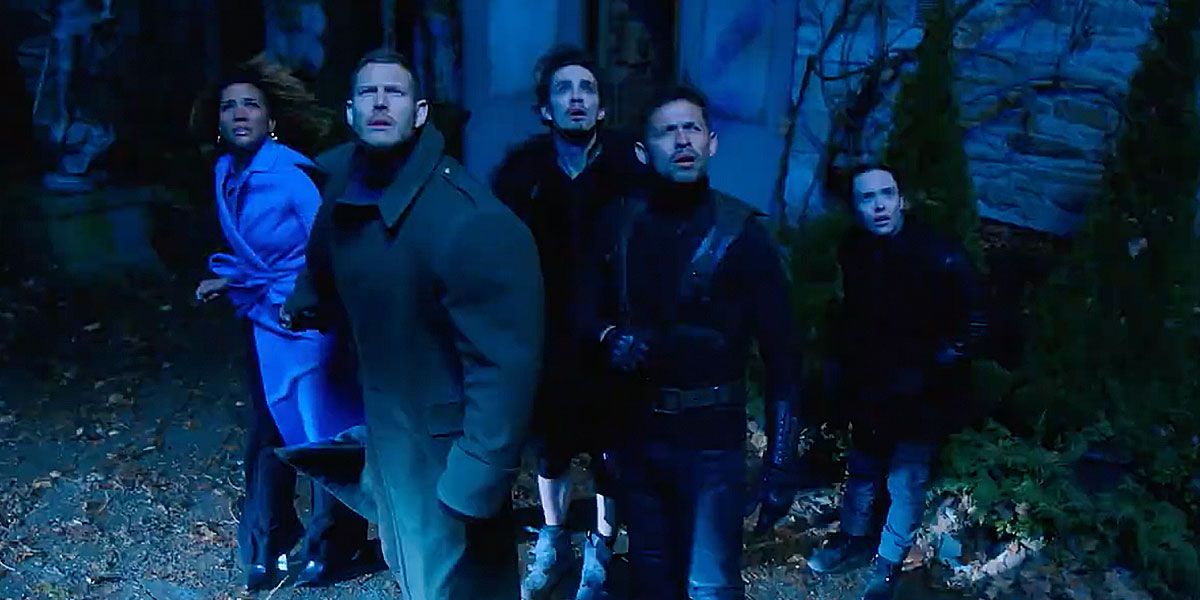Netflix’s The Umbrella Academy is a much different superhero drama than the streaming giant has produced in the past. Fans of Gerard Way and Gabriel Ba's Dark Horse comics series will be familiar with the dysfunctional superhero family, but audiences new to the work are about to be introduced to a darker interpretation of what it means to grow up in a family of superhumans. The Incredibles this is not.
The Umbrella Academy is introduced as seven children adopted by mysterious billionaire Sir Reginald Hargreeves (played expertly by Com Feore) shortly after their enigmatic births to women who had previously shown no signs of pregnancy. Hargreeves raises them as lab rats, more or less, coaching them in how to hone their powers and training them to be a team of heroes not unlike the X-Men. Each has a unique gift (hypnotic coercion, super-strength, communication with the dead, etc.) that enables the team to coordinate effective attacks on criminals.
RELATED: Everything The Umbrella Academy Trailer Tells Us About Netflix's New Series
Unfortunately, while his tactics work in helping the children to develop their powers, Hargreeves' utter lack of paternal affection warps each child in unique ways, until the team disbands by the time its members reach adulthood. Like the comics, the Netflix adaptation picks up with the siblings reunited as fractured adults by their father’s death, and the threat of a looming apocalypse forces them to try and work together once more.
The family’s made up of some familiar faces: Ellen Page as Vanya/Number Seven, Tom Hopper (Game of Thrones, Black Sails) as Luther/Number One, David Castañeda (Sicario: Day of the Soldado) as Diego/Number Two, Robert Sheehan (Misfits) as Klaus/Number Four, Colm Feore (Battlestar Galactica) as Hargreeves, Aidan Gallagher (Nicky, Ricky, Dicky and Dawn) as Number Five, and Emmy Raver Lampum (Hamilton) as Allison/Number Three.
Perhaps the biggest task of The Umbrella Academy, beyond faithfully adapting Way and Ba’s work, was creating a cohesive family unit that lifts off the page fully formed when the show begins. The shared history of the Umbrella Academy kids is vast and labyrinthine, and no small amount of nuance is needed to create the rooted, dysfunctional relationships that drive the story. Luckily, the ensemble works together flawlessly, to the credit of the actors and showrunner Steve Blackman. Both wounds and affection run deep with these siblings, and those contradicting, but equally present elements are alive from minute one.
RELATED: The Umbrella Academy Learns How to Stop the Apocalypse in First Trailer
Blackman smartly uses the increased real estate offered by 10, hour-long episodes to expand on, and examine, each character in far more depth than could be accomplished in two comics miniseries (and counting). Instead of altering the source material, The Umbrella Academy enhances it, breathing more life into a story that had been limited by format. Fans of the characters are blessed with an embarrassment of riches when it comes to getting more insight into everyone’s shared history and how it’s affected them in adulthood.
That said, Blackman’s visual interpretation is notably more understated than what we see in the comics, although it doesn’t chafe. The universe feels otherworldly and is stunningly rendered in moments, but it’s accessible, which underscores the show’s commitment to its nature as a family drama at heart. The main exception to Blackman’s light touch are Pogo and Mom. Pogo, the family’s walking, talking chimpanzee butler (voiced by Adam Godley), is a Weta creation that, perhaps unsurprisingly, looks as if he walked off a Planet of the Apes set. The soundtrack was designed as a counterpoint for much of the violence on the show, so fight scenes feel like dances and are satisfying in a much different way than something you’d see on Daredevil or The Punisher.
Beyond its nature as an adaptation, The Umbrella Academy succeeds as a television series by creating the same kind of palpable family tragedy we saw on The Haunting of Hill House, and decorating it here and there with superheroic sequences. While the powered nature of the family is never ignored, it’s also not the centerpiece, which is a shrewd choice as the superhero genre adapts and evolves, and more sophisticated audiences are less enamored with amazing feats and more curious about the inner lives of the heroes.
Perhaps the biggest change from the comics results in one of the show’s most endearing subplots: Hazel and Cha Cha, the time-traveling assassins in pursuit of an Umbrella Academy member, will give you new life. While the duo was previously only seen wearing masks, Mary J. Blige and Cameron Britton (Mindhunter) get to let their hair down and create something unique and sweet as they deal with things like job dissatisfaction one minute and mass murder the next. Blige and Cameron’s chemistry will delight, as will an additional romantic storyline original to the show.
Fans of The Umbrella Academy comic will no doubt be satisfied, as the show gifts them with a deeper look at what they love. Those new to the property can expect a much different trip into the superhero genre than they’ve taken before – punctuated by some They Might Be Giants here and there.
Arriving Feb. 15 on Netflix, the first season of The Umbrella Academy stars Ellen Page, Mary J. Blige, Tom Hopper, Cameron Britton, Robert Sheehan, Emmy Raver-Lampman, Adam Godley, Aidan Gallagher, David Castañeda, John Magaro, Ashley Madekwe and Colm Feore.



